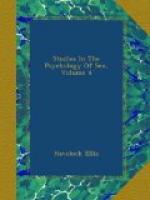While we have to recognize that the modification and even total inhibition of sexual ideals in the process of actual mating is largely due to psychic causes, such causes do not appear to cover the whole of the phenomena. Undoubtedly they count for much, and the man or the woman who, from whatever causes, has constituted a sexual ideal with certain characters may in the actual contacts of life find that individuals with other and even opposed characters most adequately respond to his or her psychic demands. There are, however, other causes in play here which at first sight may seem to be not of a purely psychic character. One unquestionable cause of this kind comes into action in regard to pigmentary selection. Fair people, possibly as a matter of race more than from absence of pigment, are more energetic than dark people. They possess a sanguine vigor and impetuosity which, in most, though not in all, fields and especially in the competition of practical life, tend to give them some superiority over their darker brethren. The greater fairness of husbands in comparison with men in general, as found by Karl Pearson, is thus accounted for; fair men are most likely to obtain wives. Husbands are fairer than men in general for the same reason that, as I have shown elsewhere,[183] created peers are fairer than either hereditary peers or even most groups of intellectual persons; they have possessed in higher measure the qualities that insure success. It may be added that with the recognition of this fact we have not really left the field of sexual psychology, for, as has already been pointed out, that energy which thus insures success in practical life is itself a sexual allurement to women. Energy in a woman in courtship is less congenial to her sexual attitude than to a man’s, and is not attractive to men; thus it is not surprising, even apart from the probably greater beauty of dark women, that the preponderance of fairness among wives as compared to women generally, indicated by Karl Pearson’s data, is very slight. It may possibly be accounted for altogether by homogamy—the tendency of like to marry like—in the fair husbands.
The energy and vitality of fair people is not, however, it is probable, merely an indirect cause of the greater tendency of fair men to become husbands; that is to say, it is not merely the result of the generally somewhat greater ability of the fair to attain success in temporal affairs. In addition to this, fair men, if not fair women, would appear to show a tendency to a greater activity in their specifically sexual proclivities. This is a point which we shall encounter in a later Study and it is therefore unnecessary to discuss it here.




